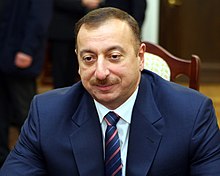Ilham Aliyev claims landslide victory in disputed Azerbaijani elections
Thursday, October 16, 2008

Image: Polish Senate.
Incumbent President of Azerbaijan, Ilham Aliyev, has claimed victory by winning 89% of the vote in the recent Azerbaijani presidential election, which were boycotted by all major opposition parties.
The major opposition parties boycotted the election due to claims that the government was limiting people's democratic rights and restricting freedom of the press. These parties described the elections as nothing more than a charade.
"Despite the boycott by some opposition parties, the Azeris made their choice in favour of Ilham Aliyev," said Ali Akhmedov, a press spokesperson for Aliyev's New Azerbaijan Party.
Aliyev faced six opponents in a presidential election. None of these competitors were considered a serious competitor by the newly re-elected president.
Isa Gambar, leader of the Musavat party, which was the main opposition party until it entered the boycott, commented on the result. "It's a farce, a tragicomedy," he stated. "The authorities were trying to force people to vote."
HAVE YOUR SAY
|
|
Should Aliyev be internationally accepted as president?
| |
Authorities state that there was a 78% turnout in the election.
At 15:00 UTC today, the Organization for Security and Co-operation in Europe (OSCE) criticized the election, but said that progress had been made. The organisation said in a press release that "yesterday's presidential election in Azerbaijan marked considerable progress, but did not meet all of the country's international commitments."
"The election was conducted in a peaceful manner, but was characterized by a lack of robust competition and vibrant political discourse facilitated by the media, and thus did not reflect all principles of a meaningful and pluralistic democratic election," continued the OSCE. "Regrettably, some opposition parties boycotted the election, citing longstanding obstacles. This further limited the scope for meaningful choice for the electorate."
Sources
- "Azerbaijan's president re-elected in landslide, to opposition parties boycott" — The Canadian Press, October 16, 2008
- Matt Robinson. "Azeri look to monitors after Aliyev victory" — Reuters, October 16, 2008
- "Azeri ruling party claims victory for Aliyev" — International Herald Tribune, October 15, 2008


